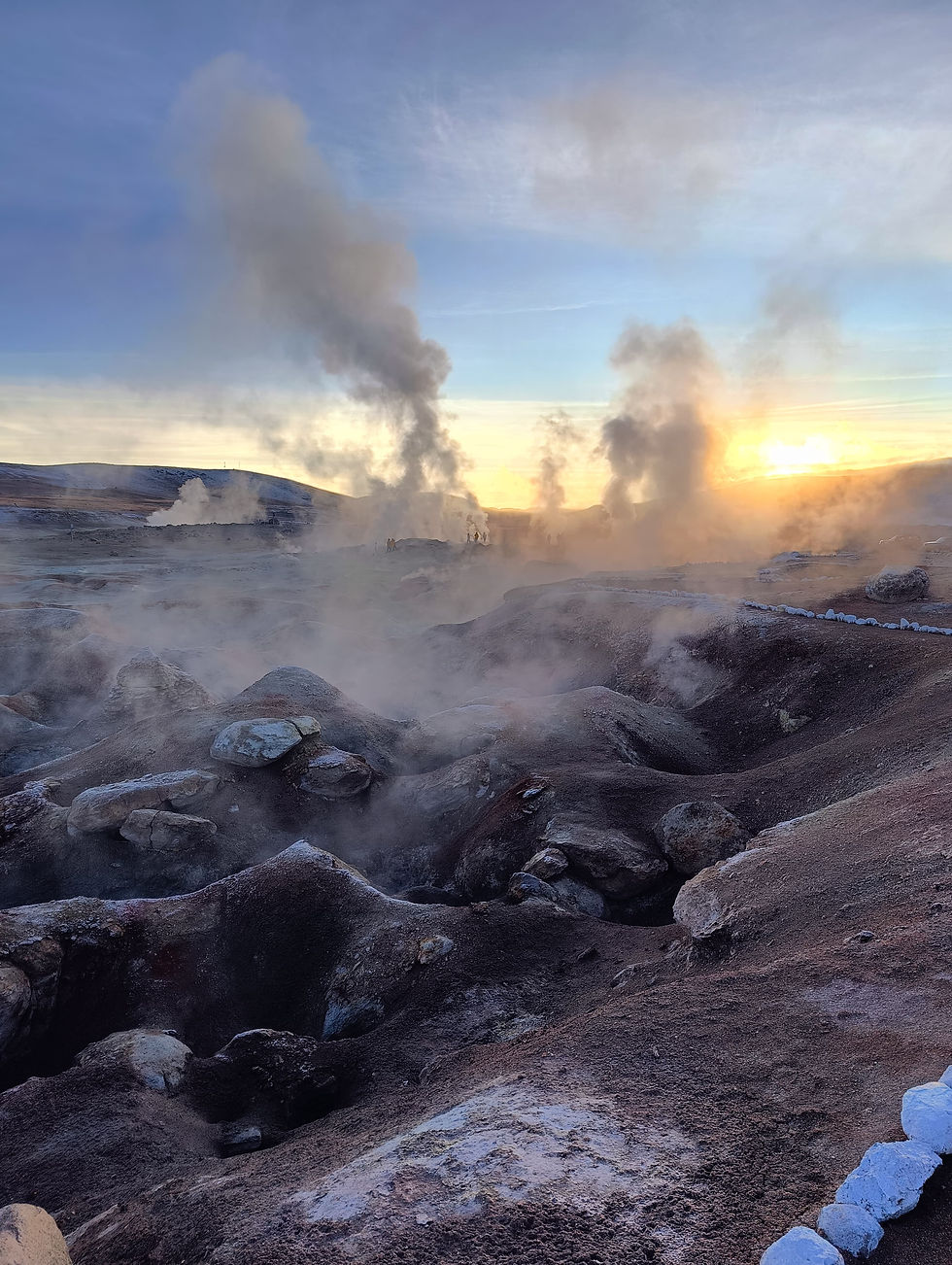South Bolivia
- vince971
- 29 févr. 2024
- 3 min de lecture
3640 meters over sea level. La Paz.
The air is thin and the people are small. The world knows the language is Spanish, the religion is Catholicism. Many don’t know about Aymara or Quechua, or who is Pachamama. I speak castellano with an accent, a sweet spot that allows me to understand and communicate without the weight of history on my shoulders.

3660m.o.s.l. Uyuni.
Away from the cable cars crossing the sky and impossibly steep neighborhoods; near a salt desert a third of the size of Switzerland. At this season, water covers the mineral, the depth varying from 5 to 20 centimeters. The nerd in me thinks “flat” does not mean “plane” at this scale, but rather has something curved to it. The artist in me throws away any understanding of perspective. The cynic in me thinks it is a giant mirror placed here for Shiva’s – or God’s, or Allah’s, or Zeus’ – diva days.
When learning that Spaniards are about to climb in the car, the guide warns them to behave well, he does not seem pleased. His mood is somewhat tarnished at the idea of spending a few days with them. He makes a few unfriendly comments. Is his reticence justified? The two Spaniards in the group did not impose their language on him or build a cathedral worshiping a god from across the ocean. They have nothing to do with dark or bright events in history that have shaped today’s Bolivia and Spain. But their culture does, and they are part of their culture. Enter the conundrum.




4100m.o.s.l. The dirt road.
We are approaching the desert. Lagunas and sand, flamingos, lamas and vicugnas. Let me reformulate: if one’s culture historically scarred another’s, is it justification for individuals from those cultures to treat each other differently? Should a Spaniard feel ashamed (to some extent) when traveling/living in South America? I’ve discussed this with friends on both side of the Atlantic, and my opinion seems to be quite unpopular... so brace yourself.
If it had been reversed, and the Spaniards had been disrespectful, there would be no doubt, no discussion: the Spaniard is racist, period. Admittedly, it is not quite the same situation, but I am very careful with double standards justified by history: from there, it is a thin line to condescension. True, a Bolivian has more reason to despise a Spaniard than vice versa. But not expecting him/her to have the capacity to move beyond this initial feeling is a bit patronizing. Let us cut the chase: I do not think the guide’s attitude was justified. I do not think Spaniard should feel any type of shame while traveling to Latinoamerica. History is far beyond anyone’s reach, and it is unfair and unproductive to drag blame through generations. Remember history, but let it be. Your concern and guilt are better placed in problems of the present, problems that you might actually influence/prevent.

4500m.o.s.l. The desert.
I do not have the feeling we have been driving upward. A European fed the above altitude imagines snow and mountain peaks. Our tour guide might imagine a great flat plain, surrounded by rounded hills and volcanoes. Grey sand, scarce moss, pink birds. The guide’s comment is not justified, and it is racist against Spanish. This strong statement does not blander the fact that he was great company, an interesting human being, and that I was glad and honored to spend a few days with him. After his first assessment, he readjusted and was a graceful guide.


5000m.o.s.l. Sunrise.
Life is not thriving here, it is surviving. Nature, on the other hand, is magnificently ignoring our shortness of breath. It is majestically - although not peacefully – disregarding life’s whims and wishes. Volcanoes, geysers, frost. There is nothing soft about our surroundings. It is bone dry, yet lightening and thunder escort our ascent. Nature taught me two lessons that day, when I dared to poke at its forbidden territories. First, Nature is a tyrant. Yet a clever one at it: unlike historical Spain, nature kills and mutilates and imposes its own uncompromising vision of the world whilst keeping everyone loving her, loving Pachamama. I dare you to find someone that openly says they do not love Dictator Nature. The second is that the above debate is, when taken with a bit more altitude, quite comical. I felt small, insignificant, below the populated, unknown sky of the Andes. The milky way was smirking at the nonsense of our lowly drama. Scratch that. The milky way was not smirking, it did not care. Sometimes, we should take ourselves less seriously.






Commentaires